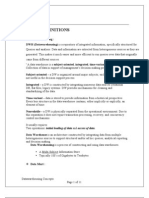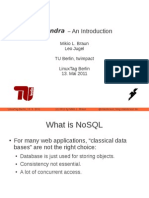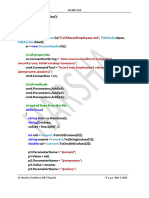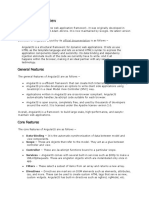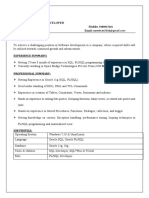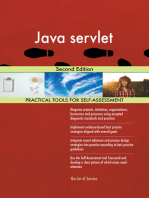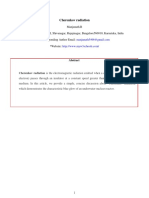0 ratings0% found this document useful (0 votes)
157 viewsBasic MongoDB Commands
MongoDB is a cross-platform, document oriented database that provides, high performance, high availability, and easy scalability. MongoDB works on concept of collection and document. This article lists about the frequently used commands of MongoDB used by developers and DBA in their day to day development and operation life.
Uploaded by
Manjunath.RCopyright
© © All Rights Reserved
Available Formats
Download as PDF, TXT or read online on Scribd
0 ratings0% found this document useful (0 votes)
157 viewsBasic MongoDB Commands
MongoDB is a cross-platform, document oriented database that provides, high performance, high availability, and easy scalability. MongoDB works on concept of collection and document. This article lists about the frequently used commands of MongoDB used by developers and DBA in their day to day development and operation life.
Uploaded by
Manjunath.RCopyright
© © All Rights Reserved
Available Formats
Download as PDF, TXT or read online on Scribd
You are on page 1/ 2
Basic MongoDB Commands
db.help() get a list of commands
show dbs print a list of all databases on the server
use myTestDB create new database "myTestDB"
db know your current selected database
db.dropDatabase() drop the current selected database
db.createCollection("Employee") create new collection "Employee"
show collections print a list of all collections created
db.Employee.drop() drop the collection "Employee"
db.Employee.insert({name: 'Raj', address: insert document in collection "Employee"
'Bangalore'})
db.Employee.find() list the documents in collection "Employee"
{ "_id" : ObjectId("60658a0dbe02cfa1d386ab52"), "name" : "Raj", "address" : "Bangalore" }
db.Employee.update({'name' : 'Raj'}, update the document in collection "Employee"
{$set: {'name' : 'Albert'}})
db.Employee.find() list the documents in collection "Employee"
{ "_id" : ObjectId("60658a0dbe02cfa1d386ab52"), "name" : "Albert", "address" : "Bangalore" }
save document in collection "Employee"
db.Employee.save({"_id": new
ObjectId("60658a0dbe02cfa1d386ab53"),
name: "Newton", address: "Delhi"});
db.Employee.find() list the documents in collection "Employee"
{ "_id" : ObjectId("60658a0dbe02cfa1d386ab52"), "name" : "Albert", "address" : "Bangalore" }
{ "_id" : ObjectId("60658a0dbe02cfa1d386ab53"), "name" : "Newton", "address" : "Delhi" }
db.Employee.remove({'name': 'Albert'}) delete document in collection "Employee"
db.Employee.find() list the documents in collection "Employee"
{ "_id" : ObjectId("60658a0dbe02cfa1d386ab53"), "name" : "Newton", "address" : "Delhi" }
db.getUsers(); list down all the users of current database
show roles list down all the roles
db.Employee.dataSize() get the size of the collection "Employee"
db.Employee.storageSize() get the total size of document stored in the
collection "Employee"
db.Employee.totalSize() get the total size in bytes for both collection
data and indexes
db.Employee.totalIndexSize() get the total size of all indexes in the
collection "Employee"
You might also like
- Loma 301 Chapter 1 Overview of Insurance Administration100% (1)Loma 301 Chapter 1 Overview of Insurance Administration12 pages
- Spring MVC 5 + Hibernate 5 + JSP + MySQL CRUD TutorialNo ratings yetSpring MVC 5 + Hibernate 5 + JSP + MySQL CRUD Tutorial19 pages
- Q1.An Animal Feed Company Must Produce at Least 200 Kgs of A Mixture Consisting of IngredientsNo ratings yetQ1.An Animal Feed Company Must Produce at Least 200 Kgs of A Mixture Consisting of Ingredients13 pages
- Tutorial 1: Serialization: Django REST FrameworkNo ratings yetTutorial 1: Serialization: Django REST Framework10 pages
- Lecture # 5 Introduction To Node - Js (Part II) : by Dr. Sidra SultanaNo ratings yetLecture # 5 Introduction To Node - Js (Part II) : by Dr. Sidra Sultana29 pages
- Nosql - Journey Ahead!: Origin: Punch Cards To DbmsNo ratings yetNosql - Journey Ahead!: Origin: Punch Cards To Dbms54 pages
- Python Django Tutorial - Django Models: Creating A ModelNo ratings yetPython Django Tutorial - Django Models: Creating A Model8 pages
- Naresh Kumar.K: Oracle SQL PL/SQL Developer MobileNo ratings yetNaresh Kumar.K: Oracle SQL PL/SQL Developer Mobile2 pages
- Hibernate Association Mapping AnnotationsNo ratings yetHibernate Association Mapping Annotations4 pages
- Summarised Interview Questions - AngularNo ratings yetSummarised Interview Questions - Angular71 pages
- Einstein's 5 Papers That Changed The Face of PhysicsNo ratings yetEinstein's 5 Papers That Changed The Face of Physics23 pages
- Top 10 Greatest Philosophers of All TimeNo ratings yetTop 10 Greatest Philosophers of All Time24 pages
- 10 Nobel Prize Winners From India You Should KnowNo ratings yet10 Nobel Prize Winners From India You Should Know24 pages
- Calculations and Interpretations of The Fundamental ConstantsNo ratings yetCalculations and Interpretations of The Fundamental Constants119 pages
- Akinyede - Medale - Building A Customer-Centric Transformation For Next Generation E-CommerceNo ratings yetAkinyede - Medale - Building A Customer-Centric Transformation For Next Generation E-Commerce11 pages
- 3.3 Characteristics of Polynomial Functions in Factored FormNo ratings yet3.3 Characteristics of Polynomial Functions in Factored Form3 pages
- BMS Upper Computer Guidance V219_241228_055244No ratings yetBMS Upper Computer Guidance V219_241228_05524422 pages
- D.W. Edwards and P.M. Wherrett ERICO Lightning Technologies Pty LTDNo ratings yetD.W. Edwards and P.M. Wherrett ERICO Lightning Technologies Pty LTD6 pages
- Unit 2 Knowledge Representation and ReasoningNo ratings yetUnit 2 Knowledge Representation and Reasoning68 pages
- MECH550P: Foundations in Control EngineeringNo ratings yetMECH550P: Foundations in Control Engineering17 pages
- Sig Sigma Implementation (DMAIC) of Friction Welding of Tube To TubeNo ratings yetSig Sigma Implementation (DMAIC) of Friction Welding of Tube To Tube7 pages
- GlobalData_TunisiaTelecomOperatorsCountryIntelligenceReport_080425No ratings yetGlobalData_TunisiaTelecomOperatorsCountryIntelligenceReport_08042542 pages
- discrete structures-assignment-2352821-DặngDuyNguyênNo ratings yetdiscrete structures-assignment-2352821-DặngDuyNguyên6 pages
- Firebird 2 Migration & Installation: Helen Borrie (Collator/Editor)No ratings yetFirebird 2 Migration & Installation: Helen Borrie (Collator/Editor)46 pages














